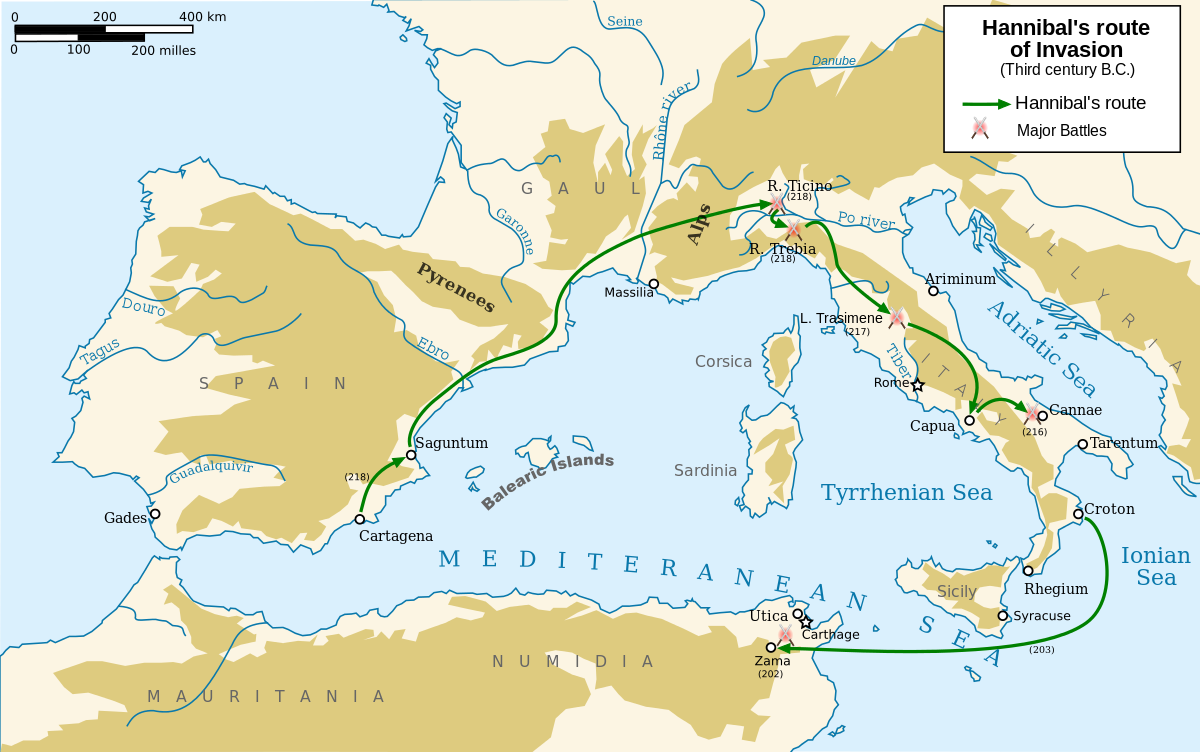
Spain is mentioned only twice, both in Paul's letter to the Romans, in which he voiced his plan to go there to preach the gospel and his hope that he may be able to visit Rome on the way there. Rome, however, was not the end of the world in Paul's time. Unfortunately, we also have no record anywhere about whether Paul did make to Spain before he died a martyr's death in Rome and, if he did, the where and what of his mission there. Acts, Luke's report of the apostles' evagnelistic and missionary exploits ends with Paul's arrival in Rome as a prisoner of the Emperor. And if Paul had died in the reign of Nero, he most likely did not make it to Spain.
For many years Rome and Carthage had been engaged in a series of wars for supremacy in the Meditteranean. In 218 BC, in what is known as the "Second Punic War," Hannibal had managed to tracked across the Alps to attack Rome. Rome was forced to take the battle to Spain to prevent Hannibal from being supplied via that peninsula. In 219 BC, they marched on Spain though the fight there would not end until Hnnibal was defeated at Zama in north Africa in 202. The Romans made the Catalan city of Tarragona their capital, and Spain would be ruled by the Romans for the next seven centuries. Under their rule Spain was divided into two military regions: Hispania Citerior and Hispania Ulterior ('Nearer Spain' and 'Further Spain'). So Romanized would Spain become she would supply the Roman Empire with three of their own for emperors: Trajan, Hadrian, and Marcus Aurelius. The famous Roman poet Seneca was also Spainish born (in what is modern Cordoba).

Roman rule in Spain came to an end in the early 6th Cent when the so-called 'barbarians,' the Visigoths, the Ostrogoths, etc., converts to Arian Christianity, went on a rampage against the Western Roman Empire, and eventually made their way towards Spain which they then occupied. Towards the latter half of that century, however, these Arian kings, recognizing that the majority of the population were inclined towards Roman Catholic Christianity switched their allegiance, and Spain has remained staunchly faithful to the Roman see ever since. Politics, however, was to bring a fateful transformation to the Spainish peninsula in the early 8th Cent. One of the belligerent in the dispult for power invited the Muslims from north Africa to help him secure his throne, and in the process, the Muslims quickly overran the country and made themselves rulers. Spain remained—despite attempts to root them out by the Christians—a leading Islamic civilization until the late 15th Cent, when, under the leadership of Ferdinand and Isabella, the Christian reconquest of successfully ended Islamic rule in Spain. The royal couple instituted a hard-core regime (including the Inquisition and the forced exile of Jews and Muslims who refused conversion) that was to become stubbornly loyal to Rome.
For a time it looked like Spain would become a major world power; their early colonization and rape of the New World, esp., of Central America, brought them gold in amounts never thought possible before. That wealth, however, was as quickly spent as it came in lavish wars after wars (one infamous example was the Spanish Armada), and vy the beginning of the 17th Cent, she was already a power in fast decline.
In all the centuries since, Spain has never really caught up with the rest of developments in the rest of Europe (except perhaps the Balkan states). The years of extreme paranoia left by the brutally oppressive and isolationist rule of General Francisco Franco who came to power in the aftermath of the Spanish Civil War (1936-39) continues to shadow life in the country.

©ALBERITH
070421lch